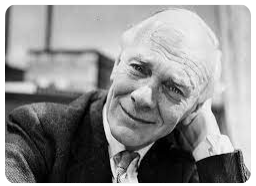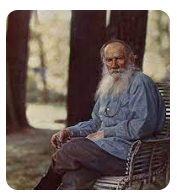Note: Play the video below while reading the account…
Quote: Gorky’s account of a glimpse he once caught of Tolstoy by the sea is memorable–one of the best things of the kind I have ever read:
_____
I once saw him as, perhaps, no one has ever seen him. I was walking over to him at Gaspra along the coast, and behind Yessupov’s estate, on the shore among the stones, I saw his smallish, angular figure in a gray, rumpled, ragged suit and crumpled hat.
He was sitting with his head on his hands, the wind blowing the silvery hairs of his beard through his fingers; he was looking into the distance out to sea, and the little greenish waves rolled up obediently to his feet and fondled them as if they were telling something about themselves to the old magician.
It was a day of sun and cloud, and the shadows of the clouds glided over the stones, and with the stones the old man grew now bright and now dark. The boulders were large, riven by cracks, and covered in smelly seaweed; there had been a high tide. He, too, seemed to me like an old stone come to life, who knows all the beginnings and the ends of things, who considers when and what will be the end of the stone, of the grasses of the earth, of the waters of the sea, and of the whole universe from the pebble to the sun.
And the sea is part of his soul, and everything around him comes from him, out of him. In the musing motionless of the old man I felt something fateful, magical, something that went down into the darkness beneath him and stretched up like a searchlight, into the blue emptiness above the earth…I cannot express in words what I felt rather than thought at the moment; in my soul there was joy and fear, and then everything blended in one happy thought: “I am not an orphan on earth so long as this man lives on it.”
_____
I feel the same because Tolstoy once did live on the earth. In dealing with such a titan as Tolstoy, moral judgments in the ordinary sense are absurd. Nor, again in the ordinary sense, can one speak of tragedy, even in the case of his last crazy sortie from Yasnaya Polyana and Sonya to die in the stationmaster’s little house at Astapovo, an obscure railway station on which, while Tolstoy lingered there, the eyes of the whole world rested.
It all had the sort of aptness that eliminates tragedy–the tragic grandeur and absurdity of life itself.
-Malcolm Muggeridge, 1968


